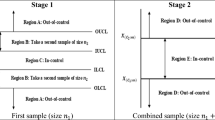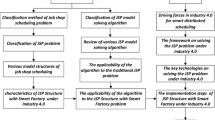Abstract
This paper presents the salient aspects of a simulation-based experimental study of scheduling rules for scheduling a dynamic job shop in which the setup times are sequence-dependent. A discrete event simulation model of the job shop system is developed for the purpose of experimentation. Seven scheduling rules from the literature are incorporated in the simulation model. Five new setup-oriented scheduling rules are proposed and implemented. Simulation experiments were conducted under various experimental conditions characterized by factors such as shop load, setup time ratios, and due date tightness. The results indicate that setup-oriented rules provide better performance than ordinary rules. The difference in performance between these two groups of rules increases with the increase in shop load and setup time ratio. One of the proposed rules performs better for mean flow time and mean tardiness measures.
Similar content being viewed by others
References
Baker KR (1974) Introduction to sequencing and scheduling. Wiley, New York
French S (1982) Sequencing and scheduling-an introduction to the mathematics of the job-shop. Ellis Horwood Limited, UK
Holthaus O (1999) Scheduling in job shops with machine breakdowns: an experimental study. Comput Ind Eng 36:137–162
Blackstone JH, Philips DT, Hogg GL (1982) A state-of-the-art survey of dispatching rules for manufacturing job shop operations. Int J Prod Res 20:27–45
Wen-Hwa-Yang (1999) Survey of scheduling research involving setup times. Int J Sys Sci, Taylor & Francis, vol 30
Allahverdi A, Gupta JND, Aldowaisan T (1999) A review of scheduling research involving setup considerations. Omega 27:219–239
Zhou C, Egbelu PJ (1989) Scheduling in a manufacturing shop with sequence-dependent setups. Robot Comput-Integr Manuf 73–81
Brucker P, Thiele O (1996) A branch-and-bound method for general shop problem with sequence-dependent setup times. OR Spectrum 18:145–161
Choi I-C, Korkmaz O (1997) Job shop scheduling with separable sequence-dependent setups. Ann Oper Res 70:155–170
Hurink J, Knust S (2001) List scheduling in a parallel machine environment with precedence constraints and setup times. OR Spectrum 18:145–161
Changa P-C, Hsieh J-C, Wang Y-W (2003) Genetic algorithms applied in BOPP film scheduling problems: minimizing total absolute deviation and setup times. Appl Soft Comput 3:139–148
Artigues C, Lopez P, Ayache P-D (2005) Schedule generation schemes for the job-shop problem with sequence-dependent setup times: dominance properties and computational analysis. Ann Oper Res 138:21–52
Tahar DN, Yalaoui F, Chu C, Amodeo L (2006) A linear programming approach for identical parallel machine scheduling with job splitting and sequence-dependent setup times. Int J Prod Econ 99:63–73
Ramasesh R (1990) Dynamic job shop scheduling: a survey of simulation research. OMEGA: Int J Manage Sci 18:43–57
Kim SC, Bowbrowski (1994) Impact of sequence-dependent setup time on job shop scheduling performance. Int J Prod Res 32:1503–1520
Rangsaritratsamee R, Ferrel Jr. WG, Kurtz MB (2004) Dynamic rescheduling that simultaneously considers efficiency and stability. Comput Ind Eng 46:1–15
Baker KR (1984) Sequencing rules and due date assignments in a job shop. Manage Sci 30:1093–1104
Law AM, Kelton WD (1991) Simulation modeling and analysis, 3rd edn. McGraw-Hill, New York
Author information
Authors and Affiliations
Corresponding author
Rights and permissions
About this article
Cite this article
Vinod, V., Sridharan, R. Dynamic job-shop scheduling with sequence-dependent setup times: simulation modeling and analysis. Int J Adv Manuf Technol 36, 355–372 (2008). https://doi.org/10.1007/s00170-006-0836-4
Received:
Accepted:
Published:
Issue Date:
DOI: https://doi.org/10.1007/s00170-006-0836-4




